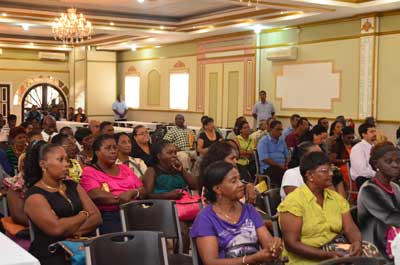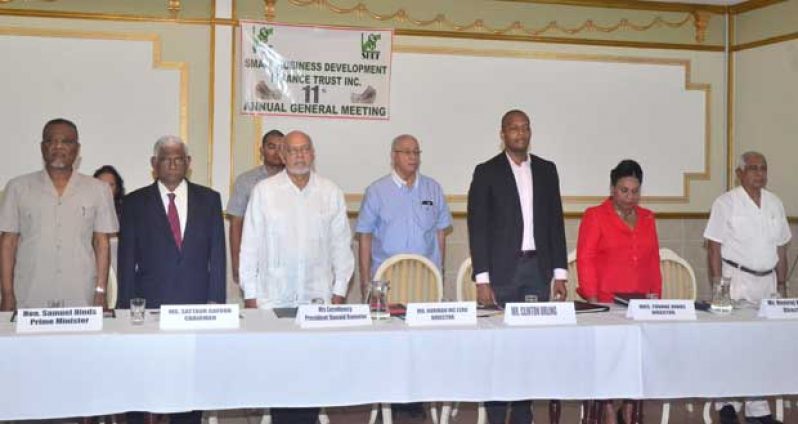PRESIDENT Donald Ramotar, yesterday, called on members of the Small Business Development Finance Trust Inc. (SBDF) to recognise the energy crisis and non-passage of the AML/CFT Bill as a few of the challenges facing the business sector and the economy.

During the 11th Annual General Meeting of the SBDF, held at the Regency Hotel in Georgetown, President Ramotar declared: “There are challenges facing small enterprise development despite our attempts to create an enabling and supportive legislative framework.”
Recognising the need for stakeholder involvement in important issues, which make or break national development, President Ramotar stressed, “There are some areas where Government will be looking to you [SBDF] for support.”
The President observed that, over the years, the People’s Progressive Party (PPP) administration has worked to ensure improved infrastructure in Guyana, which would facilitate rapid social and economic development.
EFFICIENT ENERGY
On the issue of energy efficiency and industrialisation, the President underscored that the greatest challenge to economic development is the unavailability of an affordable and efficient source of energy for production.
The President expressed concern at the relaxed position of the SBDF on issues affecting the sector. He said, “I was very surprised not to hear the voice of the small business development institution in the question of hydroelectricity in our country. This is not Government’s business along, this is everybody’s business; and if we all want our country to develop, we must make our voices heard.”
“I was very surprised not to hear the voice of the small business development institution in the question of hydroelectricity in our country. This is not Government’s business alone, this is everybody’s business; and if we all want our country to develop, we must make our voices heard.”
– President Donald Ramotar
He said, “The biggest impediment to rapid development…[and] to the development of more small business enterprises…for them to grow into medium and large scale enterprises…is the lack of cheap energy.”
He noted that if there is an available source of energy in the country, it would be conducive to developing a thriving agro-industrial sector. “Fundamentally, our country is an agricultural country, and if we want to use our agriculture as a raw material base for industrialisation, we need to have cheap energy,” the President remarked.
Outlining the benefits of the Amaila Falls Hydro-electricity Project (AFHP), the President declared that the Government had, this year, spent some $9B on subsidising electricity; whereas, had there been hydro-electricity, the monies saved by both the Government and households could have been utilised for developing more infrastructure or maintaining sanitation works, in effective garbage disposal and drainage and road maintenance.
President Ramotar alluded to a scenario wherein hydro-electricity in Guyana would result in reduced electricity costs per household by between 20 and 40 percent. He said the envisaged hydro-electricity project (AHFP) would see citizens realising these benefits in a matter of 25 years with a constant reduction in the cost of energy, as monies would only be utilised for operational costs.
These benefits, he said, are set to increase the disposable incomes of households, which in turn would convert such savings into investments and further business developments.
AML/CFT NON-PASSAGE
Speaking on the non-passage of the Anti-Money Laundering and Countering the Financing of Terrorism (Amendment) (AML/CFT) Bill, the President said that Presidential Adviser on Governance, Ms. Gail Teixeira, had been dispatched to Paris, France to represent Guyana’s position to the Financial Action Task Force (FATF).
The FATF met yesterday to discuss Guyana’s fate following its failure to pass the AML/CFT (Amendment) Bill, and President Ramotar observed that the Government has been working to adopt measures which can be taken to alleviate the potential blacklisting of the nation’s financial system.
He noted that blacklisting would negatively influence the development sectors, and stressed that he had made an offer to the Opposition that he would be willing to pass their proposed amendments to the AML/CFT Bill on condition that if the bill was found to be non-compliant with FATF regulations, the Opposition would accept the amendments that would make the legislation FATF-compliant; but, regrettably, this caveat did not find favour with the combined Opposition.
“Here, again, I think that I need your support, because all of us — every single person — could be affected, and we all need to work together to come out of this situation that we are in,” the President appealed.
Non-passage of the AML/CFT Bill threatens the development of Guyana, since the bill was introduced as a result of an international process that responds to the growing threat of international terrorism.
President Ramotar noted that the aim of the bill is to standardise, in every country, the legislation with the aim of preventing crimes of money laundering, terrorist financing, and other international criminal activities. A country that is not compliant with FATF regulations is assumed to be friendly with international criminals, money launderers and terrorists. “This is an issue that affects every single Guyanese, regardless of what political parties you belong to,” President Ramotar continued.
ACCESS TO INFORMATION
President Ramotar expressed concerns at the lack of information available to facilitate financing of small businesses in the sector. “I suspect that there are many people out there who need support in starting a small business and who do not know where to turn”, he observed.
Urging for more proactive attempts from organisations like the Small Business Development Finance Trust, President Ramotar pointed out that there is not enough information on sources of finance.
He attributed the reluctance of small investors to approach financing institutions, to the fear of being rejected and the lack of information.
The President said the role of micro financing organisations is undeniable. He said that, aside from loans, there is urgent need for technical assistance in the areas of accessing customers and supplies, access to entrepreneurial mentorship, assistance in effective accounting and management, and ideal markets for selling products.
The President, therefore, urged the organisation to recognise the many challenges confronting small businesses, and called on the organisation to cooperate with the Government in finding solutions and responses to such challenges.
(By Derwayne Wills)



.jpg)









